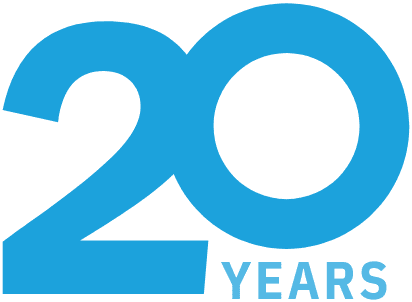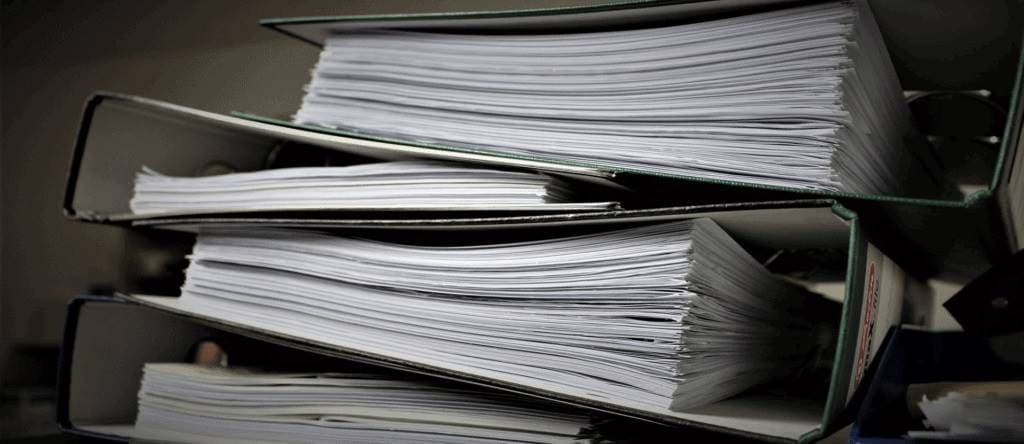Keeping business documents such as tax records, pay stubs, and other supporting documents is important. Business owners should hold on to most documents for a period of 6-7 years in compliance with the Canada Revenue Agency (CRA) standards. With rising document storage costs, complying with these standards may seem daunting. Avoid surging document storage costs – work with Blue-Pencil today. Get a quote within 30 minutes for the GTA’s award-winning document storage service.
“Blue-Pencil was efficient and professional. My documents were safe and
disposed of properly. Not only would I continue to use Blue-Pencil,
I would recommend them to everyone.”
– Immanuel Greenberg – More testimonials here!
How Long To Keep Business Documents – 6-7 Years
In Canada, the rule of thumb is to keep all important business documents for 6-7 years. The amount of time to keep documents for tax records is different in Canada than the U.S. – make sure you follow CRA guidelines as opposed to IRS guidelines! According to the CRA, you only need to keep tax records and business documents for 6 years. However, if you file your tax return late, the six-year period also begins late. To be safe, it is often best practice to keep all supporting documents for 7 years to avoid potential problems (source).
What Are Business Documents?
What exactly counts as a business document? Which documents should business owners keep and which should you throw away? First of all, the CRA states that “you are required by law to keep records of all your transactions to support your income and expenses” (source). They also state that business owners should keep an organized, daily log of all income and expenses. It is best to keep separate record logs for each business you run to avoid confusion. The CRA also notes that you should not send these records with your tax returns, but instead keep them on file in case of an audit or you are asked to provide them in the future (source).
If you are unsure what records to keep, the following list provides a brief outline for each category of business document to keep with examples. Remember, all the types of documents listed below should be kept in an organized manner to make your life and tax season easier!
Note: The list below is not exhaustive.
Income Records
Business owners must keep track of all the gross income (total income before deductions, including deductions related to goods sold). These income records should include the amount you received, the date you received it, and the source of income. You must support income entries with original documents. Some examples of original income documents include:
- Contracts
- Receipts
- Bank deposit slips
- Sales invoices
Source: The Government of Canada.
Expense Records
You should always get receipts or other proof of purchase documents when you buy something for your business. The receipt should describe the goods and services you purchased. However, the CRA recognizes that this is not always possible. In that case, it is up to you to write down a description of the goods or services received on your receipt or in a log. The receipt or purchase document should include a variety of information such as the date of purchase, the name and address of the seller or supplier, and more.
Source: The Government of Canada.
Property Records
It is also important to keep a record of all the properties you have bought or sold. These records should include important information such as:
- Who sold you the property
- How much you paid for the property
- The date you bought the property
The CRA mentions that these documents will help you calculate your claim for claims such as capital cost allowance (the deduction you can claim over year-long periods for the cost of depreciable property – source).
Source: The Government of Canada.
Why Is It Important To Keep Business Documents?
The CRA requires business documents to be kept for a minimum of 6 years – but why is this important? These documents are necessary when completing your taxes. Many of these documents can/must be used as supporting documentation for tax purposes.
Keeping important business documents for 6-7 years is required in case your business is audited or to review your tax returns. During a review or an audit, documents from the last 6 years may be required. Records can come in paper or electronic form as long as they include all supporting documentation (source).
Not keeping proper records can result in audits and possible legal action. From 2008-2009, 370,360 audits and reviews took place. Of those audits, 164 cases went to Canada’s public prosecution office (source). Running a small business or self-employment can be especially problematic, as inexperience can often lead to accidents, misinformation, and even mistakes. That is why it is so important to learn which documents you must keep on file and learn effective organization and filing skills before an audit takes place.
There is also a “repeated failure to report income” penalty. Many Canadians are charged with this penalty each year because they forget to include records of income or submit important documents such as T-slips. The penalty can be quite large, and many Canadians are not even aware this penalty exists. For example, CBC News reported in 2012 that a senior citizen ended up with a $3,600 charge due to the “repeated failure to report income” penalty. Keeping track of all your documents ensuring everything required is submitted can help you avoid fines such as the one mentioned above.
Storing and Disposing of Documents – Best Practices
Keeping records is one thing; keeping records organized is another! It’s easy to keep everything that comes into your office. It’s harder to keep everything organized and filed. However, organization is key to document storage. According to the CRA, organization is not just suggested – it is required. Here are some tips for do-it-yourself document organization:
- Keep all of your receipts: Consider organizing them by month, product, or another category that makes sense to you and your business
- Note your receipts: As mentioned above, not all receipts come with descriptions. After a few months, you may have a giant pile of receipts and no idea what they were for! Take the time to write down a sentence about the purchase right on the receipt
- Keep a daily log: Keep a daily log and note down daily purchases and income. If you are hands-on, buy a nice journal and always keep it on your desk. If you prefer the virtual world, keep a running log document or even include a small section in an existing document, such as your calendar.
- Keep virtual & paper documents: Scan or take a picture of documents such as receipts and then store them on your computer. However – do not destroy the paper documents! It’s best to keep both just in case. Preparing for the worst can save you a major headaches down the road.
Source: entrepreneur.com
Professional Document Management Companies
Another great way to keep your documents safely stored and securely disposed of when the time comes is by using a professional document management company. Working with a document management company will help give you peace of mind knowing your business documents are securely stored while not taking up much-needed space in your office!
Securely destroying tax records after the 6-7 year period is also important. It helps save you space, time, and money. At Blue-Pencil, our office shredding programs offer clients the opportunity to contract their documentation destruction management and ensure that everything will be handled securely and properly destroyed and recycled.
We fully assess your current policies and procedures to ensure that they meet standards for security, legal compliance, and cost efficiency. Once the assessment is complete it will be followed by a report that contains recommended actions and our custom program proposal. You can rest assured knowing your business documents will be both stored and destroyed when the time comes in a safe and secure manner.
Keep Business Documents Organized With Blue-Pencil!

Blue-Pencil helps empower Canadian organizations to reach new heights with friendly and efficient document management services. Customer service is not only a slogan but something we practice by investing in our strategic partners.
Located in Oakville, we have grown our document security business over the past 10 years, serving more than 6,000 organizations including small and medium-sized companies as well as Fortune 500 businesses.
We have recently launched two new divisions; Documents Storage and Records Managementdivision and Document Imaging and Scanning Solutions division. This allows us to offer full circle, comprehensive solutions for information security management. We service the GTA and surrounding cities – click here for a full list of our service areas. If you’d like to learn more about us and what we can do for you contact us today!









